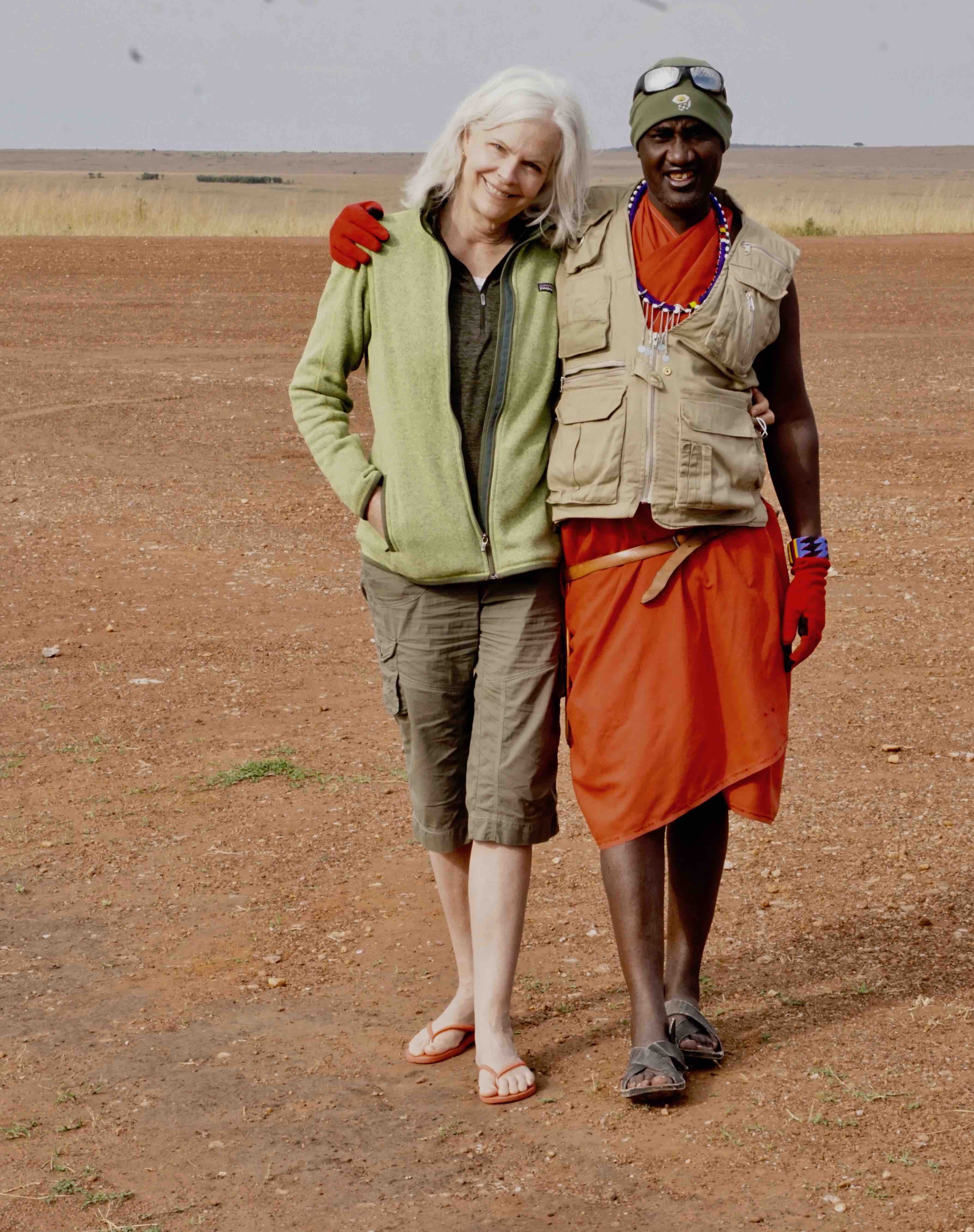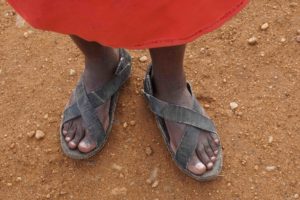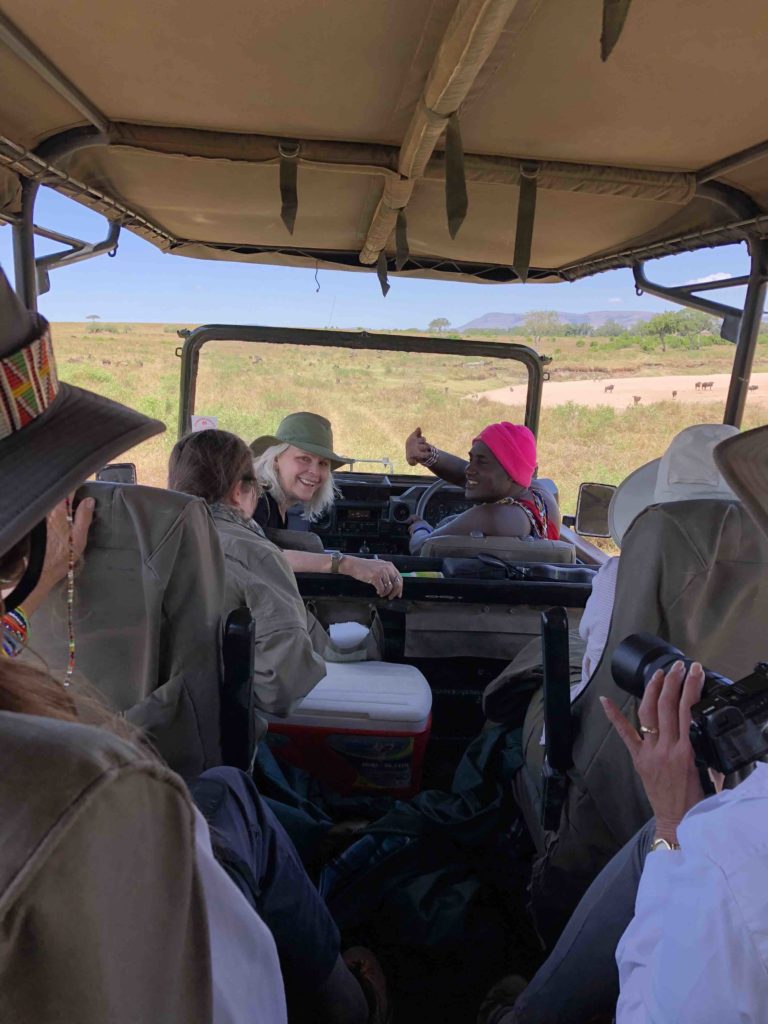
While reading The White Masai several years ago, I was shocked by the author’s decision to leave her home in Germany to marry a Masai man and acclimate to his culture and way of life. Honestly, I questioned her sanity.
The Masai’s way of life represents simplicity.
Ultimate minimalists, the Masai are part of the land and animals and connected to the earth in ways we in the modern world no longer are. They build with dung and mud, sleep on goat-skins, and drink blood and milk. They spend their time outside under the sky, entering their homes only to cook and sleep. They walk miles to visit friends in nearby villages and collect water carried on the backs of donkeys.
They generally have no TV’s, no books, no chairs, no toilets, no lights. The children play games with sticks and rocks in the dirt, the men light fires from dust, and the women bead beautiful jewelry for their husbands.

Trading shoes with Daniel, my Masai guide.
Daniel doesn’t like my flip-flops, “the thorns will push right through the bottoms,” he says. His sandals, made from old rubber tires are the only shoes he’s worn for the past seven years. “They will last another seven,” he tells me.

MASAI ARE GREAT GUIDES
Daniel works as a safari guide in the Masai Mara, Kenya’s most popular wildlife park. He grew up on this land. As part of his initiation into warrior status he lived with his peers for three years in the bush sleeping under stars and eating plants and occasionally meat. He learned life long survival skills including protecting himself from lion, elephant, and buffalo.
Listen to Daniel Sing the Lion Warrior Song
He is the best wildlife spotter I’ve hired during the 18 years I’ve been leading safaris to Africa. From miles away, with his naked eyes, he sees lions that I can barely spot through my binoculars. He knows what an animal is about to do. He maneuvers his truck away from the pack of safari vehicles suffocating each other around a wildlife sighting, correctly anticipating when the animal will move away to drink water, climb a tree, or try to hunt.
Of all the indigenous tribes in the world, the Maasai have a reputation for holding onto their culture despite the governments’ desire to change them.
Daniel sees photos of America, and tells me he has no interest in going there. “Four-lane roads and tall buildings,” is how he describes my country.
I’m drawn to Daniel. It’s a soul attraction. A connection to the minimalist side of me that is forever intimately tied to the natural world. I no longer question the decision of the author of the White Masai to exchange her world for theirs.
16 Replies to “Becoming The White Masai”
Comments are closed.

Good folks come in all colors
Good folks come from all cultures
Good wild beast eat Trump…. Yes
hm, Lori seems like you conduct the most fun Safari trips and the same time reconnecting with the earth and nature as well as the local culture.
Loved seeing your beautiful face again. Have missed reading about your safari adventures in Africa. I still remember them vividly. Happiness and good health to you always.
I love Maasai people they are such proud people and they respect the land because there life depends on the land.I have been there many times. I wish you all the happiness. I got seal boots made by hand and old rubber from tires and I have the boots for 15 year and wear them when I go to Africa on photography assignments.
How wonderful that you are so connected to Africa. I love the bit about your boots. Maybe one day we can meet each other there. That would be fun. Thanks so much for commenting and being a part of the tribe at SavingWild. All the best, Lori
So nice to hear from you Nancy. I hope one day you can join me on safari! Lots of love, Lori
Thanks Joseph. That is certainly the goal of my safaris – to immerse ourselves in the magic of Africa: its wildlife, land and people.My safaris are about connecting to the animals rather than just going down the check list of what we see. I demonstrate ways to be with the animals so that my groups have close encounters that are very special. We also visit people doing wonderful conservation work so that there is a deeper understanding of how this all works.
Exactly. Thanks so much for commenting Gary.
Hey there Lori!
This is a ‘holy cow’ of a story you have found
to share! My mind hasn’t begun the journey to
wrap itself around what the German woman has
committed to giving up for love. Although it
sounds like she does not see it that way, too
much. Thank you so much for bringing this to
us! I didn’t even read your entire email yet, as I
was excited to say “WOW UBER BEAUTIFUL
STORY LORI, THANK YOU!”
The safari sounds great and seeing wild animals but why do you drink blood?
Hi Barbara, I do not drink blood but the Maasai do. They worship their cows and take blood from their necks (without killing them) as one of their main sources of food. They kill a cow or goat every once in a while for food and use every part of the animal. Does that answer your question? Thanks for commenting.
Yes! I love this story. Plus I was there??? I think another reason for the attraction is because the Maasai people are so open and loving. It’s feels easy/natural to love when there are no walls or barriers protecting themselves. The chief said, “Ask us anything.” I fell for the young woman who brought me out to dance with her as she held my hand. And Anna at the airstrip market. She brought tears to my eyes with her generosity and friendship. She said we are friends now cause I wanted a picture with her, then she gave me a bracelet. I was so touched with her love. And her step son Wilson who helped us communicate / translate for me, then helped us load our bags when the plane arrived. He was so kind. He wanted to go play soccer in Nairobi but didn’t know how he would get there. I hope he made it…and Eunice, and Boniface and Elijah and…
BEAUTIFUL blog LR – so much love/all heart!!!! ???????
Thanks so much. My heart is full having just come back from leading 2 back to back safaris in Africa for a month. So glad you were on one of those.
Yes Angie, I was fortunate to be witness to your heart opening with each of these people you mention. I hope you will carry that openness back into your ‘normal’ world so that we can all live more from our hearts like the Maasai. Thanks for sharing your experiences here for others to feel.
Oh Jacqueline thank you so much for your wonderful comments. You have touched me very much.
LvL